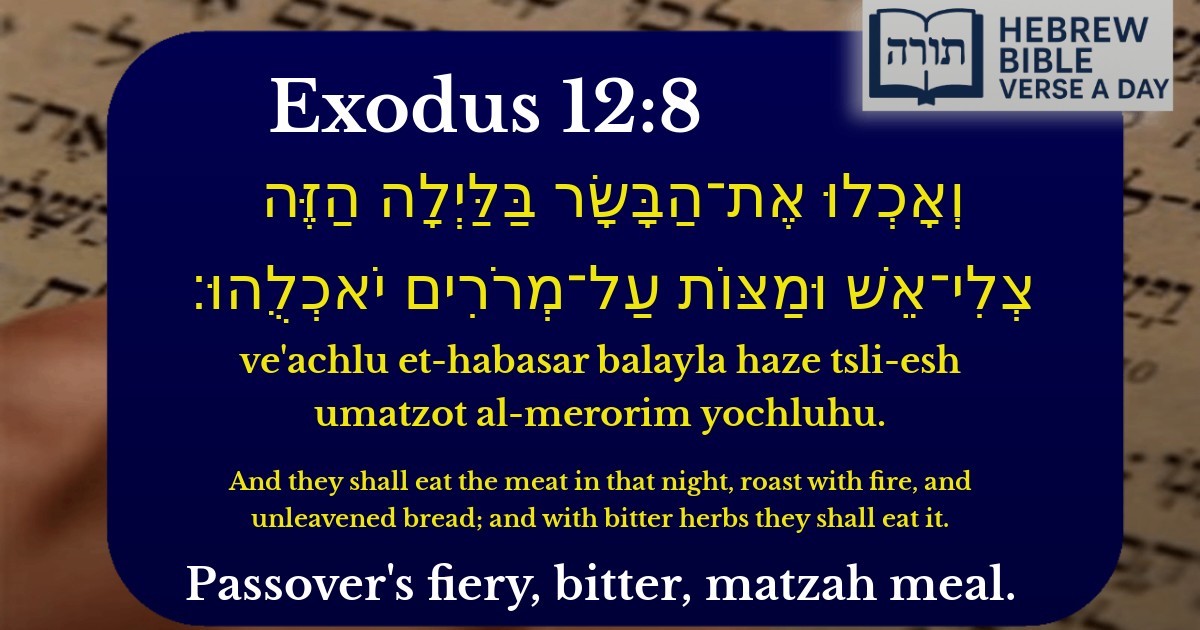Frequently Asked Questions
Q: What does Exodus 12:8 mean?
A: Exodus 12:8 describes the Passover offering (Korban Pesach) that the Israelites were commanded to eat on the night before leaving Egypt. It specifies three key elements: the meat must be roasted (not boiled or raw), eaten with matzah (unleavened bread), and maror (bitter herbs). Rashi explains that roasting was required to distinguish it from idolatrous practices, while the matzah symbolizes the haste of the Exodus, and the maror recalls the bitterness of slavery.
Q: Why is roasting the Passover lamb important?
A: Roasting the Passover lamb (צְלִי־אֵשׁ) is important because it was the method commanded by Hashem (Exodus 12:8-9). The Rambam (Hilchot Korban Pesach 8:1) explains that roasting preserves the integrity of the offering and prevents mixing with water (which could resemble idolatrous practices). Additionally, Rashi notes that roasting ensures the meat is fully cooked and not eaten raw or boiled, maintaining the sanctity of the mitzvah.
Q: What is the significance of eating matzah and bitter herbs with the Passover offering?
A: Matzah (unleavened bread) and maror (bitter herbs) are essential parts of the Passover meal. Matzah represents the haste of the Exodus, as the Israelites left Egypt so quickly that their bread did not have time to rise (Exodus 12:39). The Talmud (Pesachim 115b) teaches that maror reminds us of the bitterness of slavery in Egypt. Together, they fulfill the Torah’s commandment (Exodus 12:8) and help us relive the experience of redemption.
Q: How do we apply Exodus 12:8 today without the Temple?
A: Since the destruction of the Temple, we no longer bring the Passover offering, but we still fulfill the mitzvah of eating matzah and maror at the Seder. The Rambam (Hilchot Chametz U’Matzah 8:1) states that eating these foods keeps the memory of the Exodus alive. Many also have the custom to eat roasted meat (like a shank bone) at the Seder as a symbolic reminder of the Korban Pesach.
Q: Why does the Torah specify eating the Passover meal at night?
A: The Torah commands (Exodus 12:8) that the Passover offering must be eaten at night because the Exodus began at midnight (Exodus 12:29). The Talmud (Pesachim 120b) explains that the mitzvah must be performed during the time of redemption. Additionally, Rashi notes that eating it at night ensures it is consumed in the proper timeframe (before dawn) and emphasizes the miraculous nature of the Exodus, which happened under cover of darkness.


The Commandment of the Korban Pesach
The verse (Shemot 12:8) describes the mitzvah of eating the Korban Pesach (Paschal lamb) on the night of the Exodus, specifying three requirements: roasting it with fire, eating it with matzah, and consuming it with bitter herbs (maror). Rashi explains that these instructions were given to Bnei Yisrael while they were still in Egypt, preparing for their redemption.
Roasting with Fire (Tzli Eish)
Rambam (Hilchot Korban Pesach 8:1) emphasizes that the Korban Pesach must be roasted whole over fire, not boiled or cooked in any other way. The Mechilta adds that roasting symbolizes haste—just as fire cooks quickly, so too did Hashem redeem Bnei Yisrael swiftly from Egypt. Additionally, roasting distinguishes the Korban Pesach from pagan sacrificial practices, which often involved boiling meat.
Matzah: The Bread of Redemption
The matzah represents both the poverty of slavery (Devarim 16:3) and the speed of the Exodus, as Bnei Yisrael left Egypt before their dough could rise (Shemot 12:39). The Talmud (Pesachim 115b) teaches that matzah is called lechem oni ("bread of affliction" or "bread of answers") because we answer questions about the Exodus over it. The Seforno notes that matzah’s simplicity reflects humility, a necessary trait for geulah (redemption).
Bitter Herbs (Maror)
The maror serves as a reminder of the bitterness of slavery (Shemot 1:14). The Mishnah (Pesachim 2:6) lists five types of bitter herbs that may be used for this mitzvah, including chazeret (romaine lettuce) and tamcha (horseradish). Rabbeinu Bachya explains that eating maror alongside the Korban Pesach teaches that redemption is appreciated most when contrasted with prior suffering.
Unity of the Mitzvah
The three components—roasted meat, matzah, and maror—are eaten together to fulfill the mitzvah properly. The Midrash (Shemot Rabbah 16:2) compares this to a king who redeems his son from captivity and commands him to eat symbolic foods to remember his past and his salvation. Thus, the Korban Pesach meal is not merely a historical reenactment but a transformative experience of gratitude and identity.